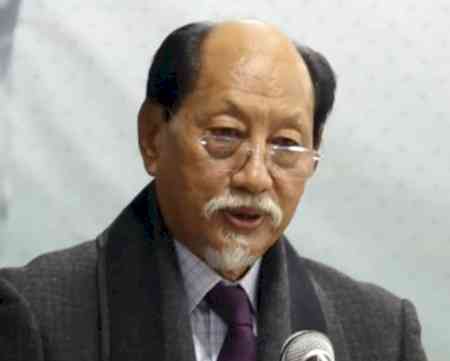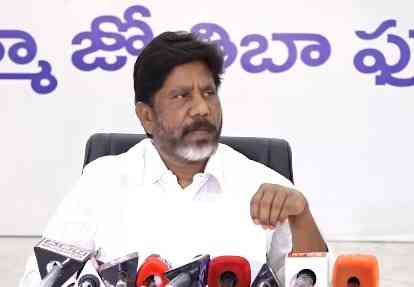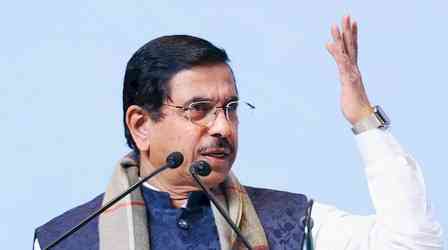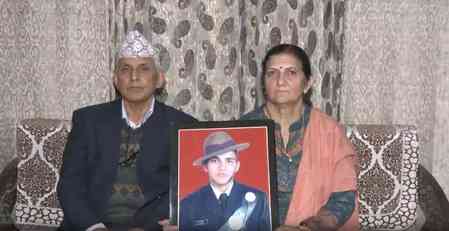Amit Shah unveils 'Statue of Peace' in Srinagar, sends message of love, tolerance returning to Naya J&K
By unveiling the "Statue of Peace" of Swami Ramanujacharya in Srinagar through video conferencing, Union Home Minister, Amit Shah, sent a strong message to the world that peace is returning fast to 'Naya Jammu and Kashmir', and the hate has been replaced by love and tolerance.
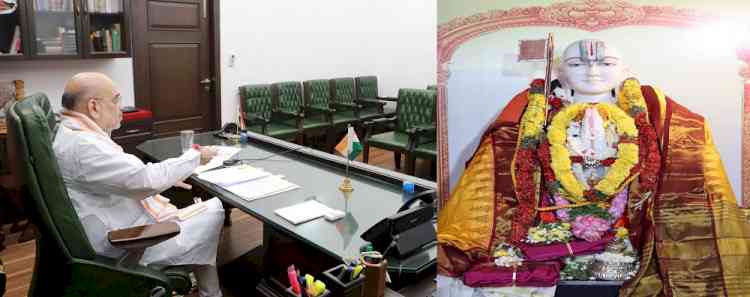
Srinagar, July 9 (IANS) By unveiling the "Statue of Peace" of Swami Ramanujacharya in Srinagar through video conferencing, Union Home Minister, Amit Shah, sent a strong message to the world that peace is returning fast to 'Naya Jammu and Kashmir', and the hate has been replaced by love and tolerance.
Shah termed the "Statue of Peace" in Kashmir a very auspicious sign for the entire country, especially J&K.
"Under the leadership of Prime Minister Narendra Modi, Lieutenant Governor Manoj Sinha has established decisive supremacy on terror in Kashmir. He has taken development to the people of Kashmir without any discrimination," Shah said in his speech.
After the abrogation of "so-called" special status of Jammu and Kashmir on August 5, 2019, and its transition into a Union Territory, Himalayan region has witnessed tremendous development.
J&K people have realised that they were misled by their so-called leaders for the 70-years by telling them that they "enjoy a special status".
In fact it was no special status but a big impediment in the way of peace, prosperity and development of the region.
Union Home Minister Shah under the guidance of PM Modi, played a pivotal role in ensuring that Article 370, a temporary provision in the Constitution of India, is done away with.
The process to revoke the Article 370 had commenced soon after Narendra Modi took over as the Prime Minister of India in 2014, but it was given final shape by Amit Shah and his team in 2019, when the Bharatiya Janata Party (BJP) returned to power with a thumping majority.
On August 5, 2019, Amit Shah presented the Bill to revoke J&K's special status in Rajya Sabha and earned the title of being the new Sardar (Vallabhbhai Patel) of India. Despite BJP not having enough numbers in the Upper House, Shah and his team convinced the MPs that the government's decision is beneficial for the nation and the ones who understood it supported the J&K Reorganisation Bill moved by Shah to abrogate Article 370.
The Bill was passed in Rajya Sabha and subsequently Lok Sabha gave its nod to end the 70-year old long status-quo in J&K.
PM Modi, HM Shah made it possible
After August 5, 2019, Jammu and Kashmir has turned from a "separatist state" into a "super state". J&K people have realised that they belong to India and their future is secure with the country.
By repealing Article 370 India gave a befitting reply to cross-border terrorism perpetrated by Pakistan. No one had even thought that the so-called special status of J&K would ever be revoked but PM Modi and the Union Home Minister made it possible.
Article 370 remained a shibboleth for Kashmir based parties for the 70-years. The National Conference and Peoples Democratic Party used to claim that if this Article is done away with, J&K would end up in the lap of Pakistan and the J&K's accession with India would end.
The revocation of Article 370 is about to complete three-years. The myths that were created by the so-called Kashmiri mainstream leaders stand shattered. Neither Kashmir has burnt nor has it fallen into the lap of Pakistan. Its complete merger with the Union of India has turned J&K into one of the fastest growing regions in the country.
Peace, investment proposals and tourists have become integral parts of J&K during the past 3-years.
PM Modi-led government has sent a clear message to Pakistan through surgical strikes and air strikes that terrorism won't be tolerated and the breaching of Indian borders is not going to be that easy. It's for the first time that India's security policy has come out of the shadows of its foreign policy.
Before Narendra Modi took over as the Prime Minister of the country there was a policy paralysis in the country, the Prime Minister's Office was "compromised" and India's respect in the world had taken a hit. After 2014, political stability has come as the era of coalition governments has ended.
The political stability ensured that the PM Modi led government "bites the bullet" and ends the uncertainty in Jammu and Kashmir once for all.
Major decisions taken by Shah
Union Home Minister Shah took major decisions after the abrogation of Articles 370 and 35-A, which provided so-called special status and privileges to the permanent residents of J&K.
After J&K's transition into a Union Territory, the Ministry of Home Affairs issued multiple orders to notify the adaptation of Central and State laws in J&K. As many as 48 Central laws were adapted in the UT.
The MHA issued J&K Reorganisation Act order on March 31, 2020 by publishing a gazette notification. Through the order, the MHA amended 109 laws and repealed 29 laws of the erstwhile Jammu and Kashmir State.
The MHA amended a 2010 legislation, the Jammu and Kashmir Civil Services (Decentralisation and Recruitment Act), by substituting the term "permanent residents" with "domiciles of UT [Union Territory] of J&K".
The domicile law also allowed West Pakistan Refugees and children of women who married non-locals to apply for jobs in J&K. This law ended the seven decade long discrimination faced by the people in Jammu and Kashmir.
Perks of former J&K chief ministers were withdrawn. The MHA repealed the 1984 State Legislative Members Pension Act, depriving former J&K chief ministers of perks and privileges.
One time financial assistance of Rs 5.5 lakh was provided to displaced families of PoJK, Chhamb and West Pakistan Refugees under Prime Minister Development package. More than 42000 displaced families were covered under this scheme.
The J&K Panchayati Raj Act, 1989 was amended to set up District Development Councils (DDCs) in each district of J&K. The creation of DDCs was the last and final step in establishing a fully functional
Panchayati Raj System in the Union Territory as mandated under the 73rd Constitutional Amendment, 1992.
Restoration work of temples, shrines, gurduwaras was undertaken. Hundreds of temples were vacated in the 1990's when Kashmiri Pandits fled the region after the Pakistan sponsored armed insurgency broke out in Kashmir.
There were a total of 1,842 Hindu places of worship in Kashmir including temples, shrines, holy springs, holy caves and holy trees. Of the 952 temples, 212 were running while 740 were in a dilapidated condition. Just 65 temples remained open after Pandits left Kashmir in the early nineties. But during the past three years pristine glory of many religious places has been restored.
The MHA initiated another law which got the approval of Parliament under which an individual could be declared as terrorist by the government.
Following the enactment of the Unlawful Activities (Prevention) Amendment Act, the MHA declared Jaish-e-Mohammed chief Masood Azhar, Lashkar-e-Taiba founder Hafiz Muhammad Saeed, Mumbai terror attack accused Zaki-ur-Rehman- Lakhvi and fugitive gangster Dawood Ibrahim individual terrorists.
The MHA also -designated Pakistan-based chief of Kashmiri militant group Hizbul Mujahideen Syed Salahuddin as a terrorist. According to the new law any designated terrorist can be arrested in any part of the world.
The MHA also released a new map of India depicting Pakistan-occupied Kashmir (PoK) as part of Jammu and Kashmir.
After the abrogation of Article 370, separatists like Hurriyat hawk late Syed Ali Shah Geelani, Hurriyat dove, Mirwaiz Umar Farooq, so-called JKLF chief Yasin Malik, chief of radical women organisation, Aasiya Andrabi, and others were cut to size. Barring Mirwaiz and Geelani, others were sent behind bars.
Geelani passed away while Mirwaiz turned silent. Security cover of the separatists was withdrawn soon after the February 14, 2019, Pulwama suicide attack which left 40 paramilitary CRPF personnel dead.
MHA decisions pave way for G-20 summit in J&K
The decisions taken by the MHA led to improvement in the security scenario in J&K with shutdown, street protests and stone-pelting becoming a history. Tourists from across the world have visited J&K after August 5, 2019 and their number is swelling with each passing day.
Encouraged by the tourist footfall and international business houses showing keen interest to invest in J&K, the Government of India chose J&K as one of the venues to hold the G-20 summit meetings to be held in 2023.
The G-20 is a politico-economic alliance comprising 19 countries. It comprises the world's largest advanced and emerging economies, representing about two-thirds of the world's population, 85 per cent of global gross domestic product, 80 per cent of global investment and over 75 per cent of global trade.
During the past two years, J&K has received business proposals worth thousands of crore from the foreign investors. The J&K Government has signed six agreements with the business houses based in the United Arab Emirates (UAE). These business houses would be investing in real estate, infrastructure, tourism, healthcare and manpower employment sectors in J&K.
The foreign investments have already started pouring into J&K and the UAE has emerged as a major partner in the development of Union Territory.
Dubai making an entry into J&K for the first time in the past seven decades is an indication that the world has recognised the pace at which J&K is transforming. The J&K is on an irreversible path of development and prosperity and world is endorsing J&K's emergence as one of the top most regions in India.


 IANS
IANS 
